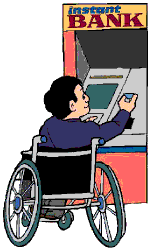|
Vol. 8, No. 3 Summer 2000 |
Subscribe to AT Messenger Download PDF Viewer |
The Americans with Disabilities Act: Gateway to Access
by Laura J. Waterland, Esq.
Staff Attorney
Disabilities Law Program
It seems hard to believe that the Americans with Disabilities Act (42 USC Section 12101 et seq) has celebrated its 10th birthday. Heralded as the "Civil Rights Act" for people with disabilities, the ADA is ever-evolving and continuously being interpreted and refined in the courts and in settlements between parties.
In the ADA, Congress provided judicial relief for people with disabilities who have been discriminated against on the basis of disability in employment (Title I); in access to facilities and services provided by state and local government (Title II); and in access to facilities and services provided by public accommodations (Title III). In addition to general provisions relating to non-discrimination, each Title also requires entities to make reasonable accommodations of policies, practices, and procedures in order to allow people with disabilities to work or to use facilities and programs. Finally, the ADA discusses standards for making modifications for older buildings (those built before the effective date of the ADA) and accessibility standards for buildings built or substantially modified after the effective date of the ADA.(footnote 1)
The ADA's First Decade
Much of the legal activity and attention in the ADA's first decade has focused on the employment discrimination provisions of Title I. The United States Supreme Court issued a series of decisions in June 1999 that narrowed a key definition of the ADA-namely, what constitutes a "qualified individual with disability." (footnote 2) However, the Supreme Court has also issued several decisions confirming key components of the ADA, such as holding that people with asymptomatic HIV are disabled (Bragdon v. Abbott, 524 U.S. 624 (1998)) and that people who apply for Social Security disability benefits are not precluded from filing concurrent Title I claims under the ADA (Cleveland v. Policy Management Systems Corp., 119 S. Ct. 1597 (1999)).
 A Question of Access
A Question of Access
To many in the disability community, the equal access provisions of the ADA are the real heart of the statute, yet, until recently, relatively few cases have been litigated under these sections. Perhaps the most notable Supreme Court case is L.C. v. Olmstead, 119 S. Ct 2176 (1999), which found that states may not unnecessarily segregate and institutionalize individuals with disabilities and must seek to provide services in the most integrated setting possible in the community. The Supreme Court held in Pennsylvania Department of Corrections v. Yeskey, 524 U.S. 206 (1998) that the provisions of Title II apply to state prisons.(footnote 3)
Individual litigants, often assisted by state protection and advocacy systems (P&As) or the United States Department of Justice (DOJ) (footnote 4), have been making headway in fleshing out and enforcing the access provisions of the ADA. Some notable successes include:
(1) In several jurisdictions, P&As have sued to ensure that lottery retailing sites are accessible (California, Louisiana, New Mexico, Pennsylvania and others.) (footnote 5)
(2) In Texas and Arkansas, successful litigation has improved accessible voting facilities.
(3) A number of hotel chains have been successfully sued to improve access and prevent discrimination in pricing, including Sheraton, Roadway Inns, and Days Inn.
(4) The DOJ and private litigants have pursued large multiscreen movie theaters, including Gulf State Theaters and Cinemark.
(5) Several cases have been brought against large retailers, including Macy's and Filene's, to improve access inside and outside stores.
(6) Carnival Corporation has been sued regarding its pricing of accessible cabins on cruise ships.
(7) In transportation, the DOJ and private litigants have pursued remedies against Greyhound and a number of transportation authorities, including Bay Area Rapid Transit, Chicago Transit Authority, Massachusetts Bay Transportation Authority, Southeastern Pennsylvania Transit Authority (SEPTA), and others.
 (8) A number of cases have been brought to challenge the quality of paratransit,
including SEPTA, Tidewater Regional Transportation District, and others.
(8) A number of cases have been brought to challenge the quality of paratransit,
including SEPTA, Tidewater Regional Transportation District, and others.
Regional Access Issues
Closer to home, the Disabilities Law Project (DLP), a P&A operating in Pittsburgh and Philadelphia, has brought numerous access cases on behalf of clients in Pennsylvania, with great results:
(1)The DLP successfully sued the Pennsylvania Department of Public Welfare to ensure compliance with the ADA by health care providers who provide services under the Medicaid program. (Anderson v. Department of Public Welfare, 1 F.Supp.2d 456 (E.D. Pa. 1998).
(2) They successfully negotiated a settlement in which Pittsburgh agreed to install curb cuts whenever streets were resurfaced or otherwise altered. The DLP negotiated a similar settlement in Philadelphia.
(3) The DLP filed a series of cases against smaller establishments in the Harrisburg area and in the southside district of Pittsburgh to increase awareness among smaller businesses of access requirements and to illustrate just how difficult access can be on a daily basis for people with disabilities living in their communities.
(4) The DLP has brought cutting-edge litigation against PNC Bank and Mellon Bank challenging the accessibility of ATM machines.
Local Access Issues
In Delaware, the Disabilities Law Program of Community Legal Aid Society, Inc. (CLASI) has assisted clients pursuing access issues in a variety of contexts, using not only the ADA but also the state public accommodations law, 6 Del. Code Chapter 45. (footnote 6)
(1) We filed a complaint in U.S. District Court to compel the owner of the Midway Shopping Plaza, Louis Capano & Sons ("Capano"), to provide adequate curb cuts in the shopping center parking lot, adequate and appropriately placed signs as well as an appropriate number of accessible and van accessible parking spaces. After some delay and haggling, Capano completed the required work and the case was dismissed.
(2) For several years, we negotiated with the Rusty Rudder, a Dewey Beach restaurant, to make the main entrance, the deck and the restrooms accessible. When it became clear that the owner had no intention of complying with the ADA, we filed a complaint in federal court. As with the Midway Plaza case, the federal court complaint prompted the owner to meet with us and to negotiate ADA compliance. However, people continue to experience trouble accessing the restrooms.
(3) CLASI has assisted clients in filing and negotiating settlements under the state Public Accommodations law against a cab company (refusal to assist blind rider because of service animal); an airport shuttle service (failure to send accessible van to person with wheelchair); the State Fair and Midway Slots (inadequate parking for person with mobility impairment); and a Sussex County restaurant (refusal to permit entry for blind patron with a service animal), among others.
 (4) CLASI recently filed a complaint in federal court against the Delaware
Department of Health and Social Services on behalf of a deaf person with
mental illness, who has been involuntarily hospitalized rather than placed
in the community simply because the State has not developed any appropriate
community-based settings. This case is attempting to enforce the integration
mandate outlined in the ADA and upheld and discussed by the United States
Supreme Court in the Olmstead case mentioned earlier.
(4) CLASI recently filed a complaint in federal court against the Delaware
Department of Health and Social Services on behalf of a deaf person with
mental illness, who has been involuntarily hospitalized rather than placed
in the community simply because the State has not developed any appropriate
community-based settings. This case is attempting to enforce the integration
mandate outlined in the ADA and upheld and discussed by the United States
Supreme Court in the Olmstead case mentioned earlier.
(5) Earlier this year, an intern in our office discovered a virtually unenforced state regulation regarding gas station access. According to Section 2912 of Title 6 of the Delaware Code, service stations offering full-and self-service pumps and stations offering only self-service pumps are required to post signs which indicate how patrons with disabilities are accommodated. Any self-service station having two or more employees on duty must assist the customer who cannot use the self-service pumps. CLASI is inquiring whether this law is being followed by DELDOT and individual service stations.(footnote 7)
(6) The District of Delaware office of the DOJ has pursued complaints in Delaware. Most significant perhaps is the Consent Agreement filed between DOJ and Dover Downs regarding numerous access issues there. Other cases include complaints against Delaware Park and Omega Partners, owners of medical office buildings in Stanton.
Many access problems can be, and are, resolved informally through negotiations. Many businesses are more than willing to provide improved access once a problem has been brought to its attention (and the costs are shown to be relatively low). However, people who encounter obstacles to access should not hesitate to pursue remedies under state and federal law if attempts at informal resolution fail. The ADA provides a powerful tool for people with disabilities to advocate for and to force improvements in access throughout the communities in which they live.
Footnotes
1) Aggrieved individuals may seek relief under Titles II and III of the ADA by filing an administrative complaint with the Civil Rights Division of the United States Department of Justice (which may or may not pursue judicial relief), or by filing a complaint in federal district court. Title I complainants must exhaust administrative remedies by filing with the EEOC or its designated state agency (usually the state Department of Labor.) The ADA does not provide for money damages for Title III claims. However, the Department of Justice may seek civil penalties that are paid to the complainant. [Back to article]
2) Sutton v. United Air Lines, Inc. 119 S. Ct. 2139 (1999); Murphy v. United Parcel Service, Inc., 119 S. Ct. 2133 (1999); and Albertson's, Inc. v. Kirkinburg, 119 S. Ct. 2162 (1999), all holding that potential ADA plaintiffs must be evaluated in their mitigated or corrected state in ascertaining whether they are "substantially limited in a major life activity" and consequently disabled. [Back to article]
3) The broader question, whether Congress exceeded its authority in making Titles I and II applicable to states and violated the 11th Amendment (which protects states from being sued by private citizens) has been the subject of much litigation. The U.S. Courts of Appeal have split on the issue. The Supreme Court has agreed to hear a case, Garrett v. University of Alabama,193 F.3d 1214, cert. granted, -S.Ct.-, 2000 WL 122158. (US, April 17, 2000)(No. 99-1240) which may address this issue. Interestingly, Garrett is an employment discrimination case. [Back to article]
4) The DOJ has investigated and settled via the Consent Order process or has litigated either directly or as an intervenor in many cases. Check the DOJ website for a review of cases (www.usdoj.gov/crt/ada). They have taken on larger companies but have also sued to enforce access in places such as day care centers, doctors' offices, and restaurants. [Back to article]
5) The Disabilities Law Program of Community Legal Aid Society, Inc, Delaware's P & A, reviewed and commented extensively on the Delaware Lottery access regulations adopted last year. [Back to article]
6) Under the state law, a complainant must file a complaint with the state human relations commission within 90 days of the act of discrimination. Using the state law has the advantage of providing for mediation and offers the prospect of monetary relief. [Back to article]
7) Advocacy, Inc., a P&A in Texas, has successfully litigated the issue of access to gas stations against several major companies in Texas. CLASI staff have drafted a brochure to advise persons with disabilities of their rights under Title 6. This brochure is currently being distributed to the public. A copy can be obtained by contacting Community Legal Aid Society, Inc., 302-575-0660. [Back to article]
Meet the Delaware Assistive Technology Initiative Staff
The Americans with Disabilities Act: Gateway to Access

